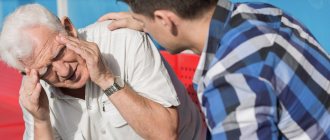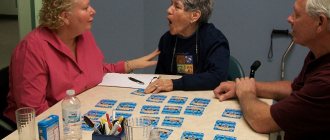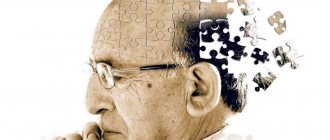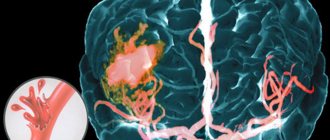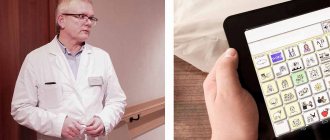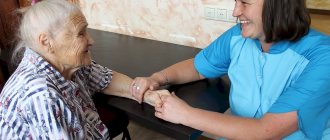Human long-term and short-term memory can be compared to a modern information repository, in which it is easy to find the necessary data.
- Why do memory impairments occur after a stroke?
- What are the manifestations of memory impairment?
- What is the danger of memory loss after a stroke?
- Is memory restored after a stroke?
- How long does it take to recover memory after a stroke?
- Care and recovery after a stroke at the Olympia House nursing home
Relatively speaking, all actions are reproduced by the brain on the basis of collected, processed and applied information, which must be ensured for safety in any situation.
Thanks to active thought processes, a person identifies himself, remembers how to walk and talk, eat and chew. Unfortunately, a disease such as stroke in older people can lead to the loss of certain areas of memory, which leaves a negative imprint on every moment of life after a stroke.
Why do memory impairments occur after a stroke?
The consequence of a blockage or rupture of a vessel is a stroke, and a person can suffer such a condition on his feet without noticing any changes. In some cases, the circulatory system suffers, which cannot deliver oxygen-enriched blood to a certain area of the brain and the cells of the cortex gradually die.
Cellular necrosis and lack of proper medical care remain the main causes of deterioration in health after a stroke. Against the background of such complications, partial or complete paralysis, immobilization of facial muscles and drooping of the corner of the mouth or eye, speech dysfunction and memory loss develop.
If the problem is noticed in a timely manner and qualified recovery after a stroke , it is possible to avoid the consequences. This situation is due to the fact that when a certain part of the brain is inactive, living cells can perform additional functions after a rehabilitation program.
It is impossible to predict the consequences of a stroke, but immediately after diagnosing such a condition, doctors can provide the necessary assistance. And by organizing proper care at home or placing an elderly person in a special rehabilitation boarding house, you can restore all lost body functions.
What affects memory?
A person’s memory is influenced by many different external factors that can enhance or, conversely, reduce it. Memory disorders are caused by factors that negatively affect brain structures. Quite important information can be forgotten quickly and for a long time? It is important to find out why this happens and what exactly affects memory.
Memory disorders vary in nature. Psychological and gynecological ailments can lead to a decrease. For example, in women due to hormonal imbalance, thyroid disorder.
Some internal diseases contribute to the decrease, deterioration, and inhibition of memory. Negatively affects memory:
- prolonged stay in a nervous tense state;
- severe life events when future disorders are inevitable;
- lack of sleep (gradually and irrevocably reduces memory functionality);
- depression that hurts and exhausts not only the soul. Constant negative thoughts in the head are reflected in the brain in the same way. Depression, according to doctors, is a disease that needs to be treated, otherwise memory can be lost completely and without the possibility of recovery.
Among the diseases leading to memory disorders are:
- diabetes , which as a result of a malfunction of the thyroid gland haunts 10% of our citizens today. Damage to blood vessels inevitably leads to memory impairment. You can completely lose it if you do not take immediate treatment measures;
- diseases of the central nervous system , meningitis do not have the best effect on memory;
- Alcoholism reduces a person’s intellectual abilities, leads to atrophy of brain cells and, of course, first to short-term memory loss. Over time they become permanent. If left untreated, such brain amnesia can lead to irreversible consequences;
- drugs that have a destructive effect not only on memory, but also on all other structures of the brain. It is ecstasy that causes irreparable harm, as well as some sleeping pills, sedatives and antidepressants, equated to narcotic drugs;
- lack of vitamin B12 . The body requires replenishment of vitamins by taking them in combination. To normalize the functioning of the circulatory system and the functions of the human brain, in particular, you need to eat more fish, eggs, meat, and dairy products;
- chronic diseases , which affect older people more often than others;
- Parkinson's disease or multiple sclerosis . Read about the first signs of Parkinson's disease here. As it progresses, it leads to a sharp deterioration in memory. If you suspect it, you should urgently visit a neurologist and undergo the proposed examination procedures.
What are the manifestations of memory impairment?
Modern medicine proposes to consider human memory on the basis of two components that play an important role in its formation. These are short-term and long-term memory, responsible for the safety of ever-memorized information used in mental processes.
After a stroke, memory loss of various types can be diagnosed, and after such a diagnosis, the recovery process can begin with an individual selection of techniques:
- verbal memory impairment;
- visual memory disorders;
- loss of motor skills;
- disturbances of emotional-figurative memory.
The most complex and difficult to recover cases include vascular dementia, which cannot be cured. Such a diagnosis cannot be considered as a death sentence, although elderly people with dementia after a stroke completely lose adequate perception of the surrounding reality. With a properly selected course of rehabilitation and well-carried out recovery, it is possible to slow down the process of deterioration of a person’s condition and adapt it to reality.
Poor memory in older people, types of age-related memory disorders: description
Depending on the amount of forgotten information, age-related memory disorders are divided into several types:
- By amount of time elapsed:
- short-term memory – a small amount of information is remembered in a short period of time;
- long-term memory is the ability to retain large amounts of information over the past period.
- According to the relationship of events to the past and present:
- anterograde – events from the past are forgotten, current episodes are well postponed;
- retrograde – everyday information is not remembered, but events of past years are well tracked.
- According to the rate of memory loss:
- gradual memory loss - begins with a partial loss of memories of past years;
- Sudden memory loss – sudden erasure of large amounts of information.
Due to disorders
- According to the volume of forgotten information:
- global amnesia - a person forgets his past and does not remember current events;
- selective amnesia - individual episodes of past events emerge in memory.
- Visual memory loss - an elderly person ceases to recognize his loved ones, it is possible to perceive an external image, but there is a loss of contact information about the person.
- If it is possible to recover information:
- reversible memory – as a result of the restoration of systemic abnormalities in the body, memory is restored.
- irreversible memory – as a result of complex disorders in the body, the memorization, processing and storage of information is impaired.
Age-related memory disorder in an elderly person often occurs against the background of alcohol addiction and as a result of a stroke. In old age, natural memory loss occurs gradually in minor manifestations.
What is the danger of memory loss after a stroke?
The extent of the destructive impact of a stroke on the memory of an elderly person is difficult to assess without an accurate diagnosis. It depends on the intensity and area of hemorrhage or the number of dead cells in a certain hemisphere of the brain, so rehabilitation procedures should be started immediately.
The problem of memory loss manifests itself in the difficulties faced by older people who cannot identify themselves. They do not remember their childhood and adolescence, they lose their walking skills and coordination of movements, they do not understand how to eat or carry out basic hygiene.
Another dangerous point is psychological discomfort, depression and anxiety in older people. After memory loss, an elderly person sees unknown people and unfamiliar objects around him; everything seems alien and frightening to him, which can cause psycho-emotional breakdowns.
What should older people take for forgetfulness, to improve memory, how to train memory?
Memory enhancing drugs affect blood circulation and processes associated with concentration, attention and perception. Improve brain function with simple medications that have no contraindications:
- Herbal preparation Ginkgo biloba - improves blood circulation, neutralizes free radicals that destroy cells.
- Amino acid Glycine – provides protection to the nervous system.
- Omega 3 – for the prevention of cardiovascular diseases.
- Vinpocetine – helps improve metabolism in the brain. Restriction for use is cardiac arrhythmia.
- Vitamins C and E – neutralize free radicals.
- Nootropics – improve intracellular metabolic processes.
- Vitrum memory is a herbal preparation that prevents oxygen starvation.
- Aminalon - evens out the dynamics of nervous processes, removes toxins from the brain.
- Bilobil - equalizes intellectual abilities, normalizes sleep, eliminates unnecessary fears and worries.
- Memory impairment is affected by a deficiency of B vitamins and folic acid , so they also need to be included in the diet.
For an elderly person with signs of developing amnesia, it is necessary to create the right diet. The menu should include first courses in meat or fish broth, a large number of stewed and fresh vegetables and fruits.
Vascular
Preparations
The following products have a positive effect on improving brain activity:
- Grated carrots with steamed raisins flavored with sour cream.
- Dark chocolate in small quantities.
- Seeds, walnuts.
- Chopped horseradish.
- Dairy products.
- Sea kale.
- Baked and fresh vegetables.
- Fresh and dried fruits.
It is necessary to systematically train the memory of older people, stimulate the memorization process, for example, offer to sort a set of words into groups (insects, shapes, colors). Stimulating memory with regular exercises allows you to level out memory performance.
- The use of lists, reminders, and proper organization of the day can compensate for the forgetfulness of older people.
- It is very important to approach the problem comprehensively - to combine drug treatment, proper nutrition, uniform physical activity, and cognitive stimulation.
Is memory restored after a stroke?
Destroyed neural connections can be restored and this will provide the opportunity to partially or completely restore a person’s memory.
But for this it is necessary to create optimal conditions and develop a set of techniques, regularly conduct classes and monitor the current state of health of an elderly person:
- systematic memory training and activation of thought processes;
- drug therapy using memory improving drugs;
- using intellectual games and exercises to strengthen memory.
Classes and exercises should not overload the brain; in a person’s life it is important to find time for rest and entertainment. A specialized private boarding house for the elderly in the Moscow region offers unique and individually adaptable rehabilitation program complexes for people who have suffered a stroke.
How long does it take to recover memory after a stroke?
Rehabilitation procedures after a stroke carried out by specialists at our private boarding houses include an integrated approach. This means that in addition to memory restoration, psychologists work with patients to help stabilize their psycho-emotional state and return to normal life.
The process of memory restoration and its duration depend solely on the diagnosis and the degree of destruction of the neural network. It is very important that the patient immediately after a stroke begins to undergo a rehabilitation course and follows all the doctor’s instructions so that the changes become reversible.
Having lost memory and part of cognitive abilities, a person feels disoriented and often becomes depressed. For older people, it is important to organize optimal conditions for therapy and create comfortable psychological conditions under which rehabilitation will be as effective as possible.
Vitamin complexes
Together with medications, therapy is often supplemented with vitamins. They must contain omega-3 fatty acids, pyridoxine (B6) and thiamine (B1). Complexes based on ginseng are popular. Compositions may also be offered:
- Vitrum memory - helps enrich the brain with oxygen, enhance the assimilation of new information;
- Golden iodine – helps with weakened memory ability, dizziness, frequent headaches;
- Tsikovit – enhances mental capabilities.
- Memory restoration in golden age is a complex and multifaceted process. It includes both drug intervention and a proper lifestyle and balanced diet. Good results are shown by taking folk remedies and memory training techniques. Only an integrated approach and sensitive attitude of loved ones will achieve visible results.
Care and recovery after a stroke at the Olympia House nursing home
The rehabilitation programs used by our specialists include all the necessary measures to restore memory and cognitive processes.
Olympia House, a network of private boarding houses for the elderly, specializes in providing quality medical services for residents:
- compliance with the conditions of therapy and rehabilitation;
- psychological comfort and calm environment;
- constant supervision by experienced caregivers;
- assistance in hygiene procedures, feeding;
- Qualified doctors work with patients.
During rehabilitation and socialization, qualified psychologists actively work with elderly people living in boarding houses. We maintain a friendly and relaxed environment, provide leisure activities and experienced staff to provide assistance to people in dire need.
A stroke in old age can be suffered on the legs, but lack of treatment and rehabilitation can lead to the development of various consequences. Our network of boarding houses provides high-quality and targeted care for the elderly in Moscow and provides individual rehabilitation services for residents.
Memory failures and deterioration in older people: treatment
Restoring memory loss begins with eliminating abnormalities in the functioning of the whole organism, leading to brain dysfunction. In addition to taking medications, it is important for older patients to maintain their overall health through wellness activities:
- Physical therapy on an ongoing basis.
- A balanced diet with a high content of vitamins and microelements.
- A quality night's rest .
- Quitting bad habits , in particular smoking and excessive alcohol consumption.
- Development of intelligence , social participation in society.
- Completing annual examinations and general tests.
- Daily monitoring of blood pressure readings.
- Maximum removal from stressful situations.
Treatment is needed
If memory loss progresses, it is recommended:
- once a week .
- Record daily events in a diary in order to be able to recover information in a difficult situation.
- Cover distances on foot every day .
- Diversify therapy with drawing, singing, and music lessons.
- Discuss common events experienced, watching a movie and reading a book.
It is very important to maintain mental activity. It's never too late to learn new things, the main thing is to avoid heavy loads. A well-designed daily routine will help you meet all of the above conditions.
